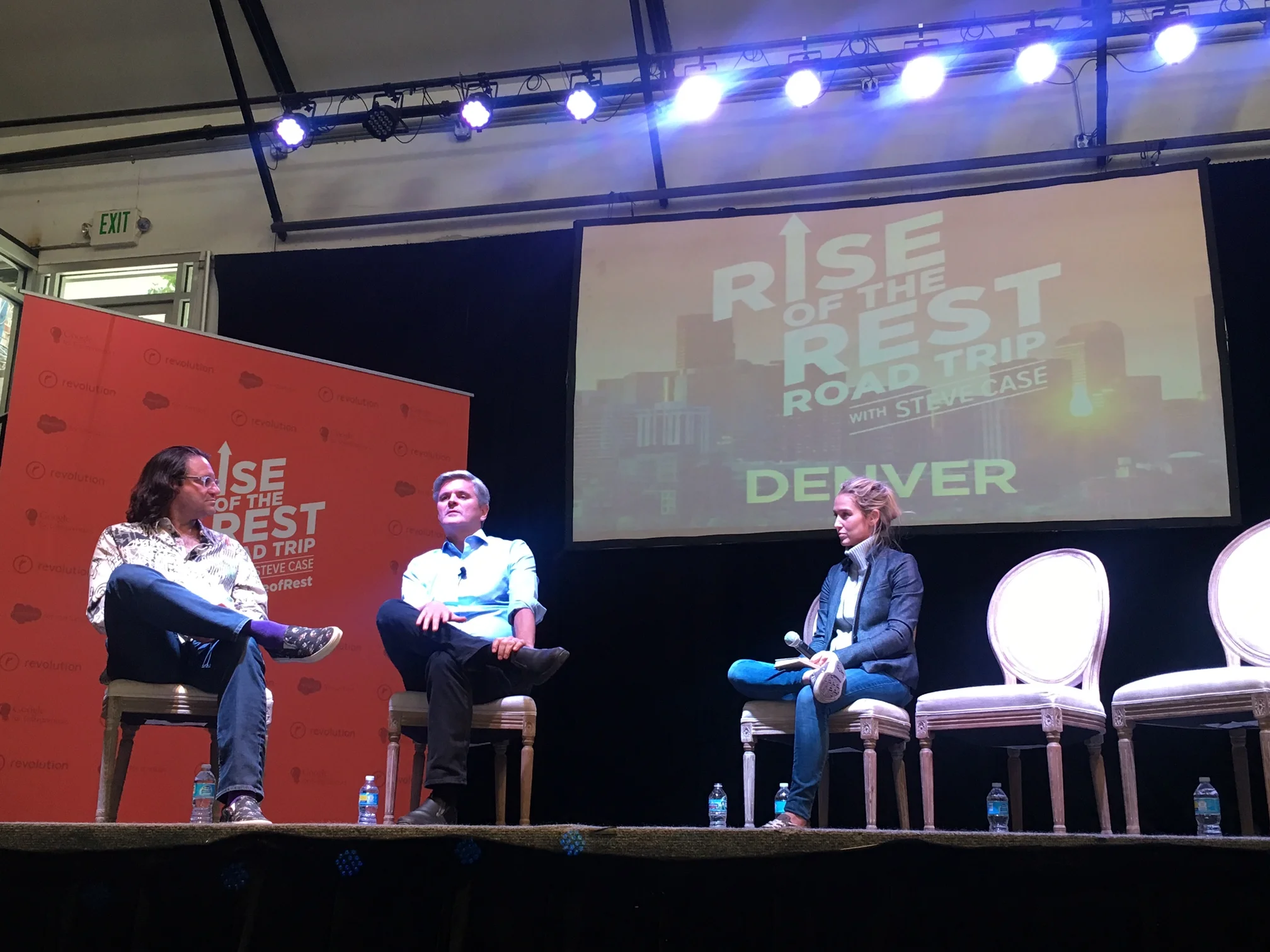This week Engine is traveling with Steve Case on the Rise of the Rest road trip to celebrate entrepreneurship, in all its forms, across America. Every day we’ll post dispatches from the cities we’ve seen. For more updates follow #RiseofRest on Twitter.
“We all win if we make it bigger.”
With a population of almost 3 million (that is growing by 100,000 every year), ten Fortune 500 companies, and a strong network of regional universities, it may be unfair to call Denver a city on the rise. However, Denver residents will be the first to recognize that the city’s environment for early stage entrepreneurs and startup innovation is continuing to develop and there is still a lot of room for the city to grow. The Rise of the Rest tour, with Steve Case at the helm, spent its second day on the road in Denver to learn from the successes and challenges of the ecosystem and inspire the wider business, policy, and educational leaders in the area to support its many entrepreneurs.
Colorado Governor John Hickenlooper at breakfast.
Denver’s startup community has experienced tremendous momentum in recent years. According to the Kauffman Foundation, Denver is one of the top five cities in terms of startup activity, and Colorado ranks #4 in the nation. As Mayor Michael Hancock shared at the welcome breakfast on Tuesday morning, in the past five years over 5,000 companies have started or relocated in Denver, 60,000 new jobs have led the city out of the recession, and $345 million in venture capital has flowed into the city. We experienced this immense growth firsthand in our visits to Battery621, a co-working space, Craftsy Production Studio, a startup that provides educational tools to help people bring creativity to life (with over $100M in venture funding!), and Industry, an office development that houses a number of startups and has played an essential role in the revitalization of Denver’s “RiNo” neighborhood.
At another stop at the Turing School of Software and Design, we saw how the Denver community’s investments in education and talent are helping to produce a large pool of potential employees for talent-hungry startups. Turing’s coding programs are producing top graduates, 92.4 percent of which are employed full-time within 120 days of graduation. Denver is also home to Galvanize, a co-working space and coding/web development school.
The tour stopped for lunch at the Bronco's stadium.
In addition to growing talent from within, Denver has seen dramatic population growth in recent years and has become the number one relocation destination in the U.S. for skilled workers ages 25 to 44. Much of the city’s draw is its quality of life, which was referenced numerous times throughout the day (yes, we know—Denver has over 300 days of sunshine per year). But in addition to lucking out with great weather and access to the outdoors, Denver has also made conscious investments in both hard infrastructure (downtown revitalization, public transportation, bike paths) and soft infrastructure (a culture of giving, a welcoming nature) to incent people to start and build their businesses in the city. As Tami Door, President and CEO of the Downtown Denver Partnership, noted at breakfast, Denver has taken the approach of, “if we build it, they will come.” And it’s clear these efforts are working: when asked “why Colorado” during Tuesday’s fireside chat, the three participating local startup CEOs highlighted the city’s quality of life as a major driving factor for building their companies in Denver.
“People are just kind here. When we first started, we tried to boil the ocean, but everybody still let us through their door.”
With all of Denver’s strengths, there are still areas where the community knows it can make improvements. During the fireside chat, Jenna Walker from Denver-based Artifact Uprising emphasized access as a major issue, both in terms of knowledge and capital. Jacqueline Ros of Revolar echoed Jenna, noting that angel funding, in particular, is scarce in the Denver area. She attributed this, in part, to the termination of Foundry Group’s Angels Syndicate in 2015.
Still, while these weaknesses may be limiting growth in certain ways, they are certainly not stopping it. We saw eight extraordinary startups at the evening’s pitch competition, including Bitsbox, a monthly subscription box for kids that teaches them to code, Airstream Health, an on-call healthcare advocate and concierge, and the competition winner, Flytedesk, which is helping brands reach millennials on college campuses.
Great crowd for the fireside chat and pitch competition at City Hall Club.
As Steve noted at the start of the day, “Denver has already risen, it just needs to tell its story and continue to build on momentum.” Going forward, other cities can learn from Denver as an example of a city that has risen above the rest. And Denver can learn from itself—continuing “make itself bigger” by capitalizing on its culture of collaboration and openness, and facilitating new connections and greater access to capital.






